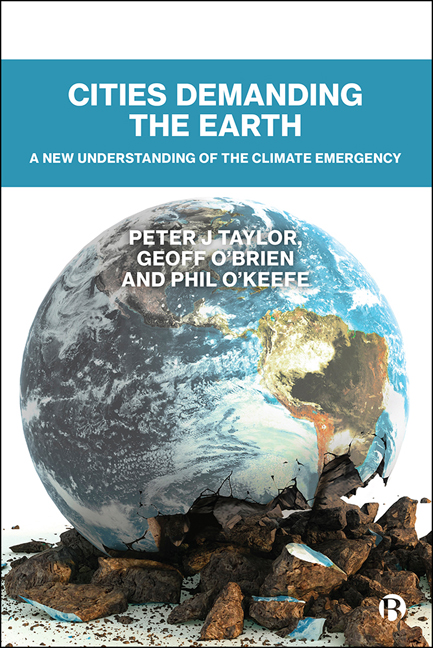Book contents
- Frontmatter
- Dedication
- Contents
- List of Tables and Figures
- About the Authors
- Preface
- 1 Declarations: Root and Branch Unthinking
- 2 Alternate: Jane Jacobs’ legacy
- 3 Inside Out: Fourteen Antitheses Authenticating Cities
- 4 Reset: Anthropogenic Climate Change is Urban, not Modern
- 5 Action: Can We Stop Terminal Consumption?
- References
- Appendix: Primer on Climate Change Policy
- Index
5 - Action: Can We Stop Terminal Consumption?
Published online by Cambridge University Press: 19 March 2021
- Frontmatter
- Dedication
- Contents
- List of Tables and Figures
- About the Authors
- Preface
- 1 Declarations: Root and Branch Unthinking
- 2 Alternate: Jane Jacobs’ legacy
- 3 Inside Out: Fourteen Antitheses Authenticating Cities
- 4 Reset: Anthropogenic Climate Change is Urban, not Modern
- 5 Action: Can We Stop Terminal Consumption?
- References
- Appendix: Primer on Climate Change Policy
- Index
Summary
Introduction: I wouldn't start from here…
Growing urban demand, millennia old with modern rapid acceleration, this is what we have identified as the integral social component, the critical ‘anthropo’, in anthropogenic climate change. Thus the Urbanocene goes back thousands of years to the beginnings of cities, their demand for food and consequent land clearances. This much longer time frame underscores global urban demand as also integral to what our species has long been, what we are now, and what we are still becoming. Urban demand is not the economist's simple demand variable; it is a way of life, a multifaceted social complex.
So how do you change a worldview, an unquestioned ideology? Part of it involves choosing the right early policy battles – game-changing ones that don't merely aim to change laws but change patterns of thought. (Klein, 2014: 461)
We have entered Naomi Klein's (2014) world of policy dilemmas pitting embedded worldviews against the need to change how we think. Put bluntly, we seem to be locked into a position where we are collectively pursuing a path with terminal consumption as the outcome. Thus the Urbanocene reveals our ‘shared DNA’ as the Earth's creative, destructive species: our consuming involves both inventively using Nature (including other humans) to satisfy our demand for stuff while simultaneously destroying Nature to produce said stuff. To continue the DNA analogy, it follows that some sort of critical ‘gene editing’ will be required to make manifest changes. As an ‘urban species’ we have to reimagine ourselves, that is to say, we must reinvent the city.
To say ‘action is needed’ is an understatement of immense proportions. And there are myriad practices and policies aimed at mitigating and adapting to climate change, with many more in the pipeline, working in countless places across the world. They should all be supported – every little helps – but they can never be enough unless uber urban demand is confronted head on. We can equate our situation with the common urban myth about a lost cosmopolitan traveller asking a local yokel how to reach a destination. The answer given is totally useless: ‘I wouldn't start from here’.
- Type
- Chapter
- Information
- Cities Demanding the EarthA New Understanding of the Climate Emergency, pp. 95 - 122Publisher: Bristol University PressPrint publication year: 2020



